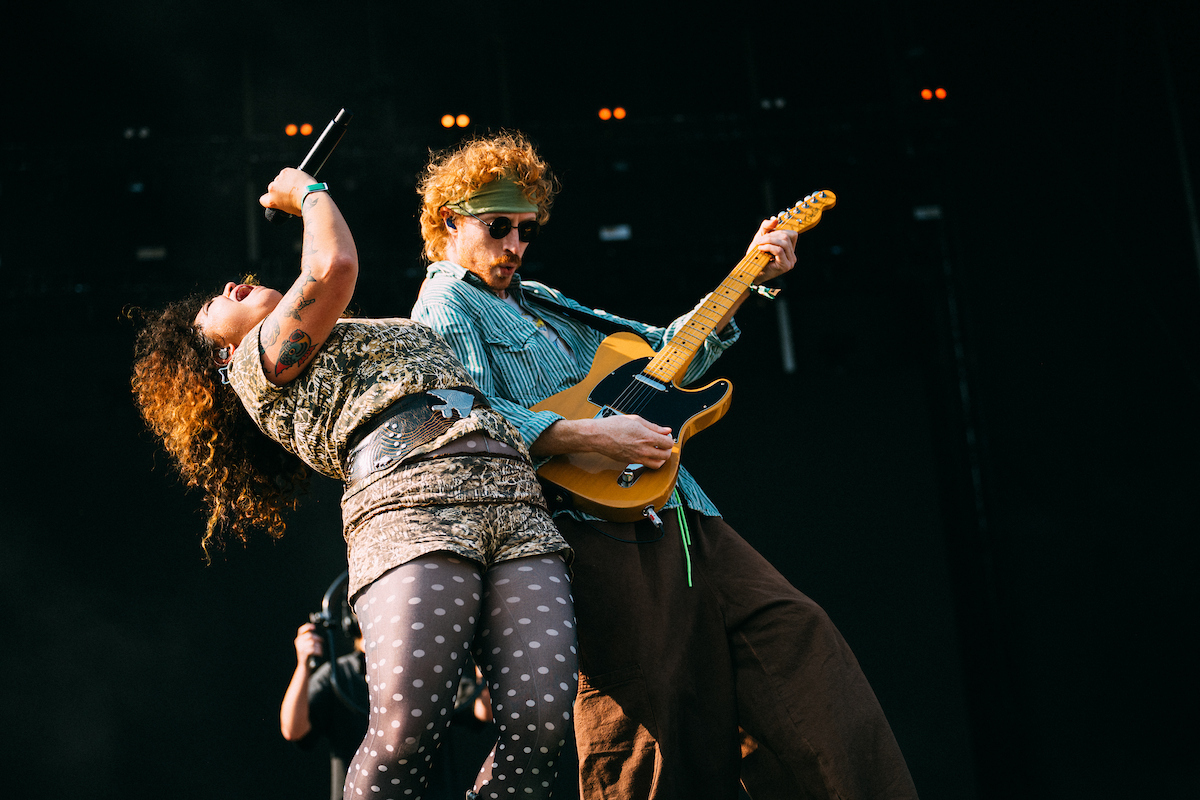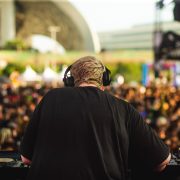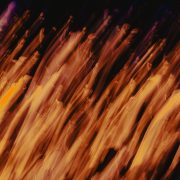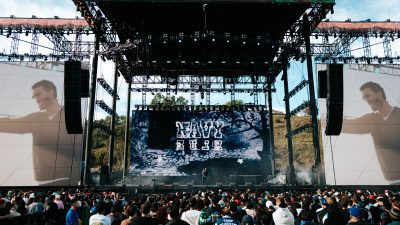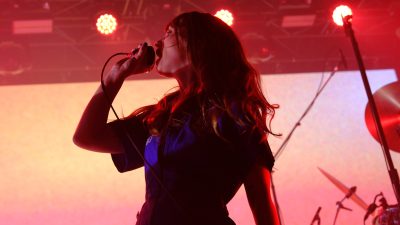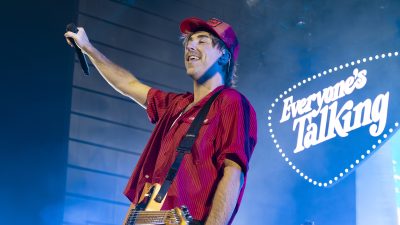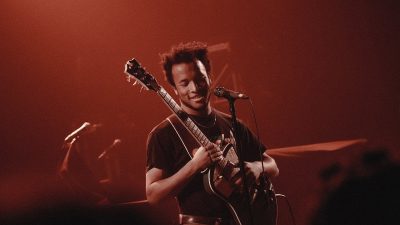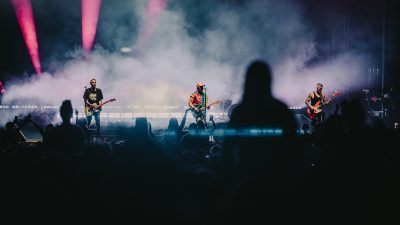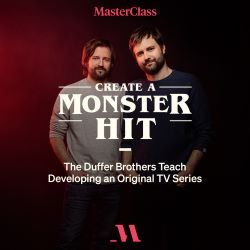Lollapalooza leaves us lifted
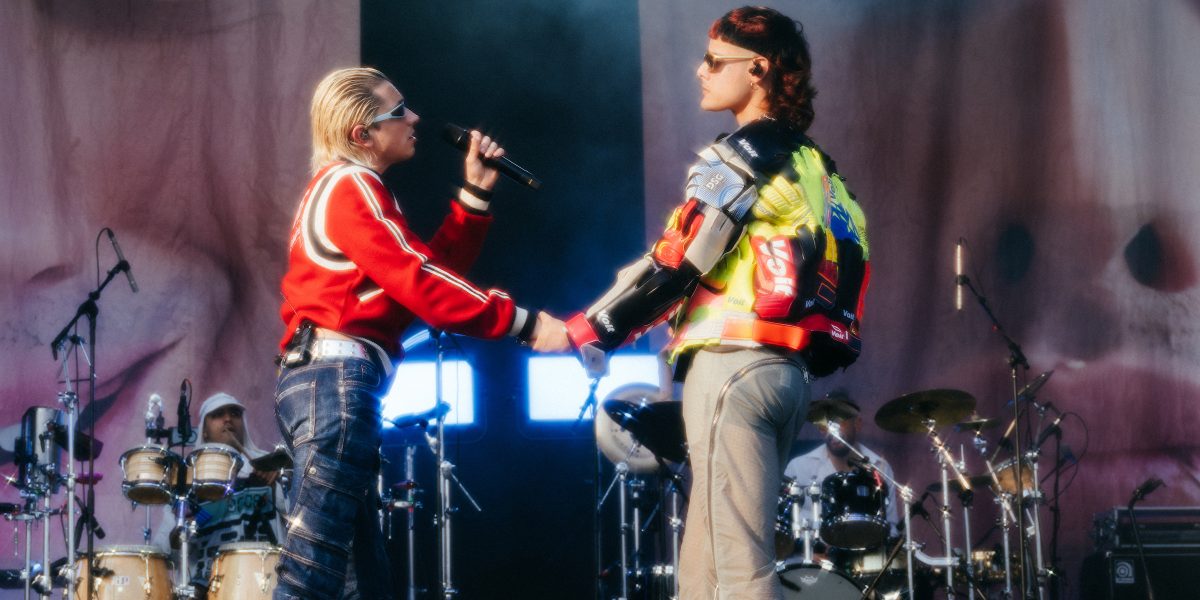
Just off the coast of Lake Michigan, a Goodyear zeppelin floated through the haze of air pollution, hovering above the daily 115,000 attendees at this year’s Lollapalooza. In the midst of a mercurial summer, the sun broke through the forecast of rainstorms to shine on Chicago’s premier music festival. Each year, the weekend brings hordes of tourists, suburbanites, and Chicago locals into the 320-acre Grant Park. To feed the masses, Lolla has imported a legion of vendors to serve you everything from Deep Dish to freshly rolled Kimbap (my new favourite street food a la local pop-up Pink Mu).

Image by Taylor Regulskifor for Lollapalooza. Cover image: Ca7riel & Paco Amoroso by Ismael Quintanilla III for Lollapalooza.
Oh, and there’s music; lots of music! Spread out over the one-mile length of the park, the festival boasts over 170 different acts from chart-toppers to local indie bands. With seven stages to choose from, the shows all share overlapping time slots, placing you in unique musical dilemmas. Do you see Gracie Abrams or Cage the Elephant? Foster the People or T-Pain? Clairo or Doechii? (I chose Doechii with no regrets but also no small amount of FOMO.)
Headliners ranged from Tyler the Creator to Korn, and a pop battle between chart Queens Olivia Rodrigo and Sabrina Carpenter. Here are Quip’s highlights from the festival:
Durand Bernarr brings Soul, R&B, and … a foot fetish?
Durand Bernarr took the 3 PM slot at the T-Mobile stage, looking like a spring day. Baggy, cloud- white boots, a green overcoat sprouting giant, multi-colored carnations, all topped off with boxy, brown epaulettes. Bernarr, a longtime performer and producer who’s just recently come into the limelight, struts around the stage with the confidence of a ballroom diva, hips swaying and shoulders animated by the slightest shimmy.
His voice is the star of the show, a buzzing baritone that warms you with vocal fry and a wide vibrato even as Bernarr slides into the upper registers of a three-octave range. Gazing at the camera like an ex-lover who now has regrets, Bernarr embodies queer confidence. The music encapsulates this, sunny and bouncy with a sprinkle of a “don’t-mess-with-me” attitude.
What would be typical R&B fare is elevated by Bernarr’s lyricism, which is sexy and tongue-in-cheek. “Who knew footprints could taste so delicious / two-step all on my face,” he sings passionately about what one can only assume is a foot fetish. “I be at the market / Piggies running round while I sit here / With my mouth open wide,” he purrs as the bass climbs up and ripples out into the crowd of fresh-faced truants.
Beyond being a fetish evangelist, Bernarr takes to being the crowd’s teacher, sometimes instructing, sometimes commanding the audience to move their bodies as well as their minds. “Turn to your neighbour and say: The trauma is not your fault, but the healing is your responsibility.” With an assertive grace, Durand Bernarr continues to step more fully into his own light, both as a musician and a performer. It’s a spectacular glow.
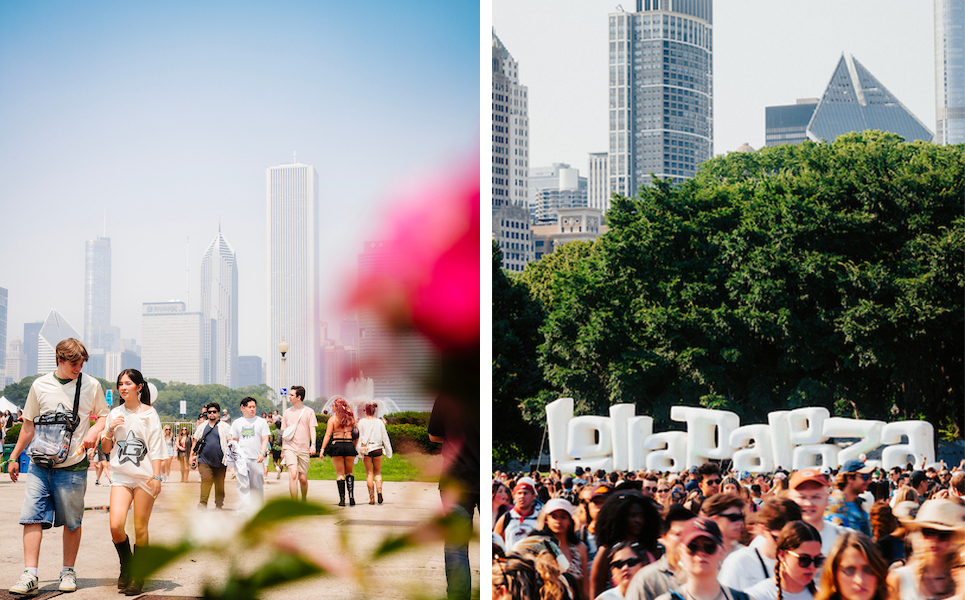
Left image by Roger Hofor, right by Nathan Zuckerfor, for Lollapalooza
The Blessed Madonna brings the protest to the party
Drag queens line the front of the Perry Stage. It’s a smorgasbord of bodies: an elf, a Lego, a bearded lady, a fairy with their heart(s) on their wings. It’s the vibe one would expect at Pride. June may be well behind us, but the gay club has come to Lollapalooza, brought to you by The Blessed Madonna.
A global sensation, The Blessed Madonna is also a staple of Chicago’s house music scene, known for their genre experimentation that infuses anything from disco to techno. Whatever she’s mixing, it always manages to feel fresh and surprising.
She takes to the stage wearing a “Punch Your Local Neo-Nazi” T-shirt as the screen flashes gritty images of protest behind the stage, boasting slogans from “Trans Power Now” to “Stop Arming Israel”. There’s a political undercurrent of resistance and empowerment that informs the supremely danceable set of mostly wordless music.
That undercurrent is anything but demure. “Bigger and bolder and rougher and tougher” blasts the hook, “I’m the one and only dominator, there is no other.” A pulsing bass line drowns your ear as the drums reset your heartbeat.
Within the incessant party that is Lollapalooza, Madonna reminds us that resistance takes many forms. Living outside of the mainstream proudly and joyfully is one of them. Midway through Thursday’s lineup, it was the perfect way to get amped up for the rest of the weekend, and a reminder for what comes after it.
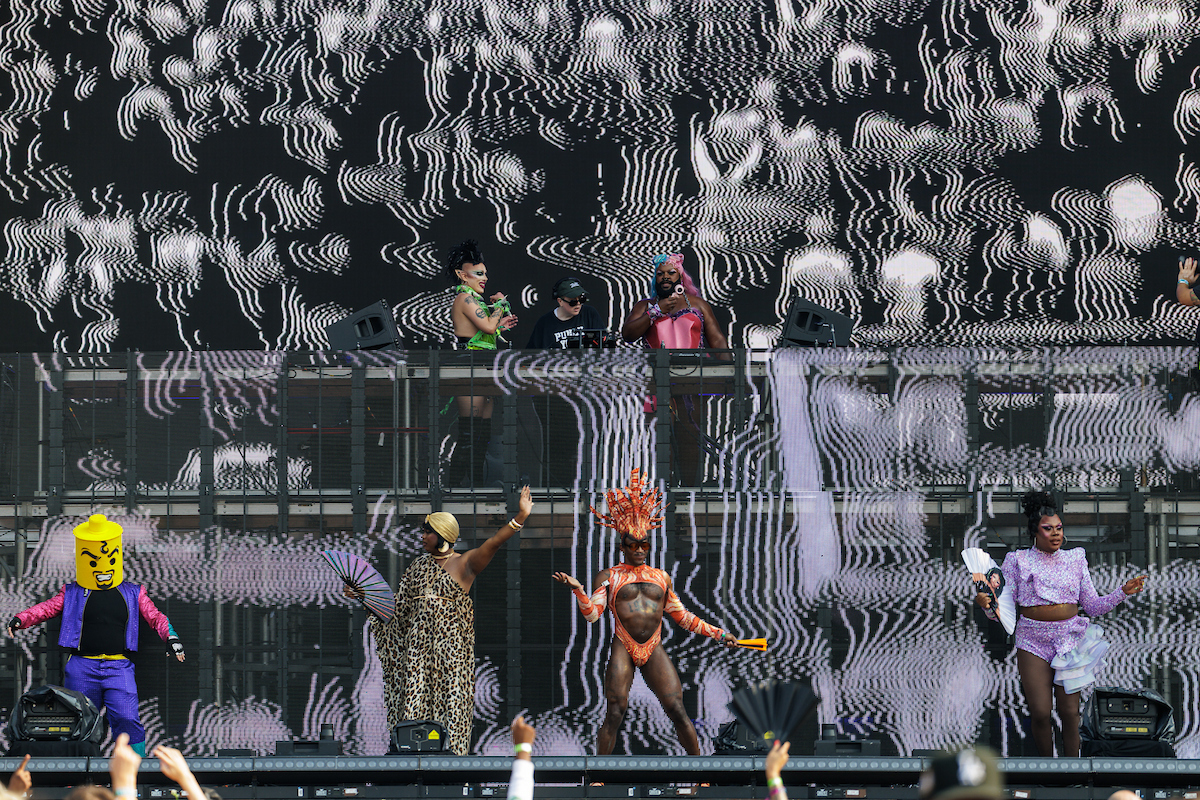
The Blessed Madonna by Shea Flynn for Lollapalooza.
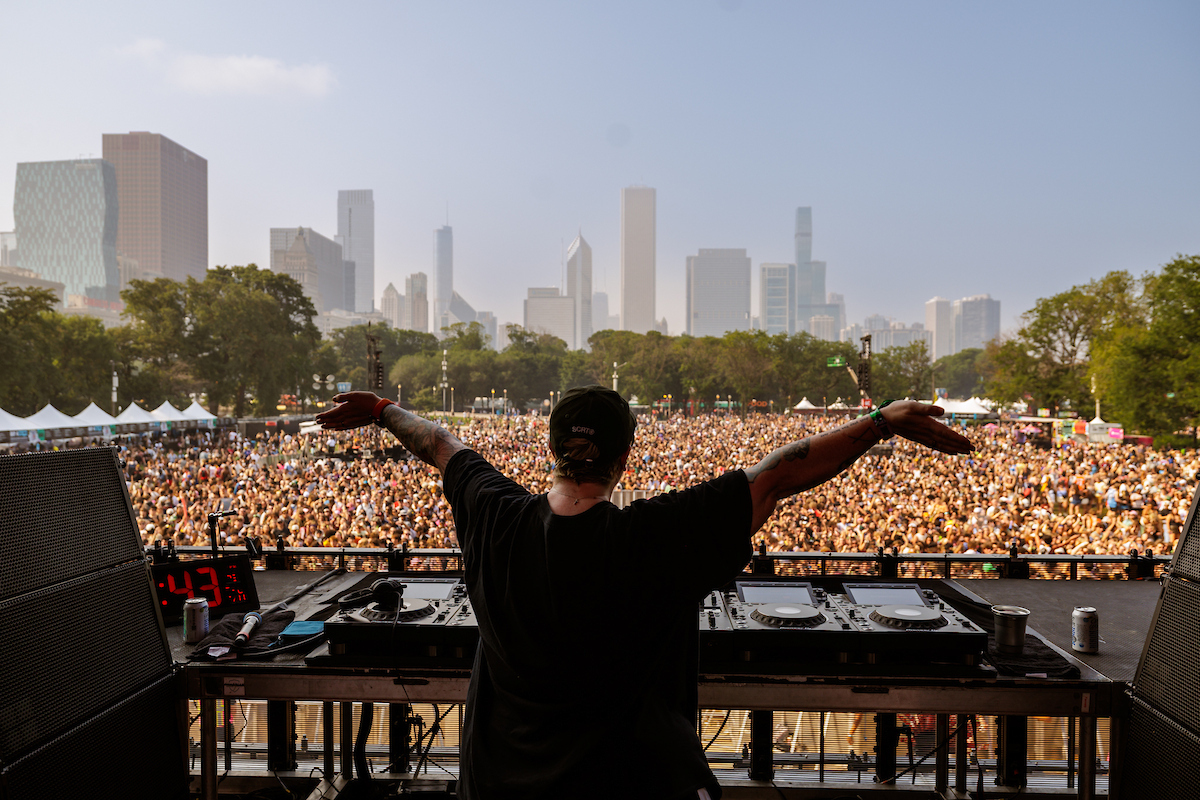
All elephant, no cage
When I arrived at the Bud Light stage, Matt Shultz, the frontman of early aughts indie darling Cage the Elephant, is running through the audience as his brother Brad crowd surfs, upturned guitar shredding into the sun. “Damn,” I thought to myself, certain I was witnessing the end of a fun set, “I must have gotten the times wrong.” I had not gotten the times wrong. Cage the Elephant had only just begun, but with the energy of a bull elephant in a china shop.
What’s beautiful about rock music is how ebullient it can make its fans. Two women in front of me turn to each other, clasping all hands and screaming the chorus of “Spiderhead” into each other’s open mouths. As Shultz runs across the stage, you can hear his heartbeat in his voice as he works up a sweat. It’s not about perfection, he’s hoarse and sometimes pitchy, but carries the unbridled energy of a showman who is giving you everything he’s got.
“It’s a pleasure to be back,” Shultz says, taking a rare breather. “Everyone in the band considers Lollapalooza to be our start. We played here back in 2007. We played right after Lady Gaga, that’s the truth. Brad threw up on stage.”
It’s easy to forget how many hits Cage the Elephant has under its belt, from “Ain’t No Rest for the Wicked,” “Trouble,” and the global hit “Cigarette Daydreams”. Still, their latest album, Neon Pill, is an extension of their evocative songwriting edge, as songs like “Metaverse” stand tall inside their earlier oeuvre.
In the set’s final minutes, Shultz took a moment to pay tribute. “This past week, we lost a legend…a beautiful human being.” They played an achingly sweet cover of Black Sabbath’s “Changes” with the sun shimmering through the skyscrapers, twilight infusing the lyrics with even more nostalgia for a legend now gone. Rest in Peace, Ozzy.
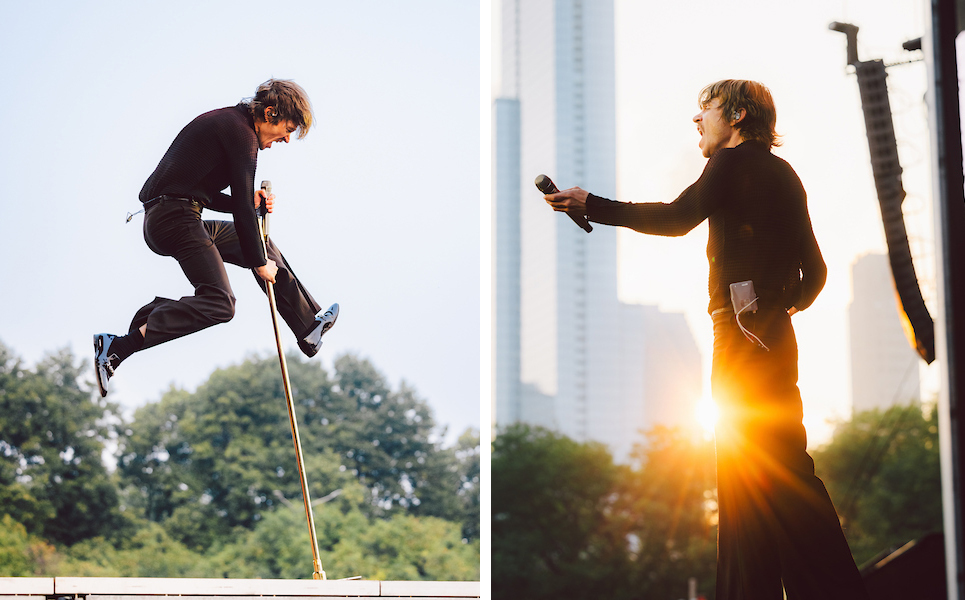
Cage The Elephant by Ashley Osborn for Lollapalooza.
#hiphoponsteroids
Making my way back to the T-Mobile stage on Saturday, I thought I’d kick back and take a breather while waiting for Doechii’s much-anticipated set. Out of the dust floating around the Lakeshore stage, I heard a thickly accented voice roar out, “How you doing, Chicago?” It was enveloped by a bombastic brass section blaring over the air.
What I love about any music festival is the potential to be surprised. You can turn a corner and find your new favourite band. Argentinian duo, Ca7riel and Paco Romoso, were just that for me. Packing in more high-octane, big-band, salubrious sound than any one stage could contain, they were a festival all on their own.
I had never seen or heard anything quite like them. The only comparison that came to mind was the recent lauded collaboration by Anderson Paak and Bruno Mars, the aptly named Silk Sonic. Ca7riel and Paco Romoso tap a similar vein, then inject it with steroids.
The result is a chaotic fusion of jazz, Latin pop, EDM, and rock’n’roll held together by the most eccentric vocal stylings you can imagine. They switch in and out of ‘characters’ faster than a Simpsons voice-over actor. One moment, they’re harmonising together in smooth Boyz II Men fashion; the next, they’re taking turns ripping through the sound barrier with some of the most percussive bars you’ve ever heard.
The lyrics are broadcast in translation in real time, which turns out to be a mistake as it causes considerable lag to the projected video. Still, what does come through only adds to the campy swag of the band. “#TETAS”, the second track off their most recent album “PAPOTA,” is a swaggering satire of social media culture. “Bigger audience, muscles, sports cars / words like glow up, vibe check,” they croon, a cornucopia of empty but emblematic words.
The duo play guides to a wannabe superstar: “If you want to be someone, you can’t be yourself,” they caution. A radio DJ interjects over the loudspeaker, “No, no, no! Bigger! Use a hashtag. Bring back the dab!” The two turn to each other, confused. “¿Como que hashtag?”
“I don’t know dude! Say tits!” Ca7riel suggests as the song (d)evolves into a mindless obedience to the popular, hashtagging and dabbing their way to success. “Hashtag Tetas/ Pectorales grandes, esa es la receta” they spew.
“Chicago, do you want more?” Paco Romoso rumbles like a wrestling emcee. He gives a knowing smirk as a jaw-droppedcrowd screams in the affirmative.
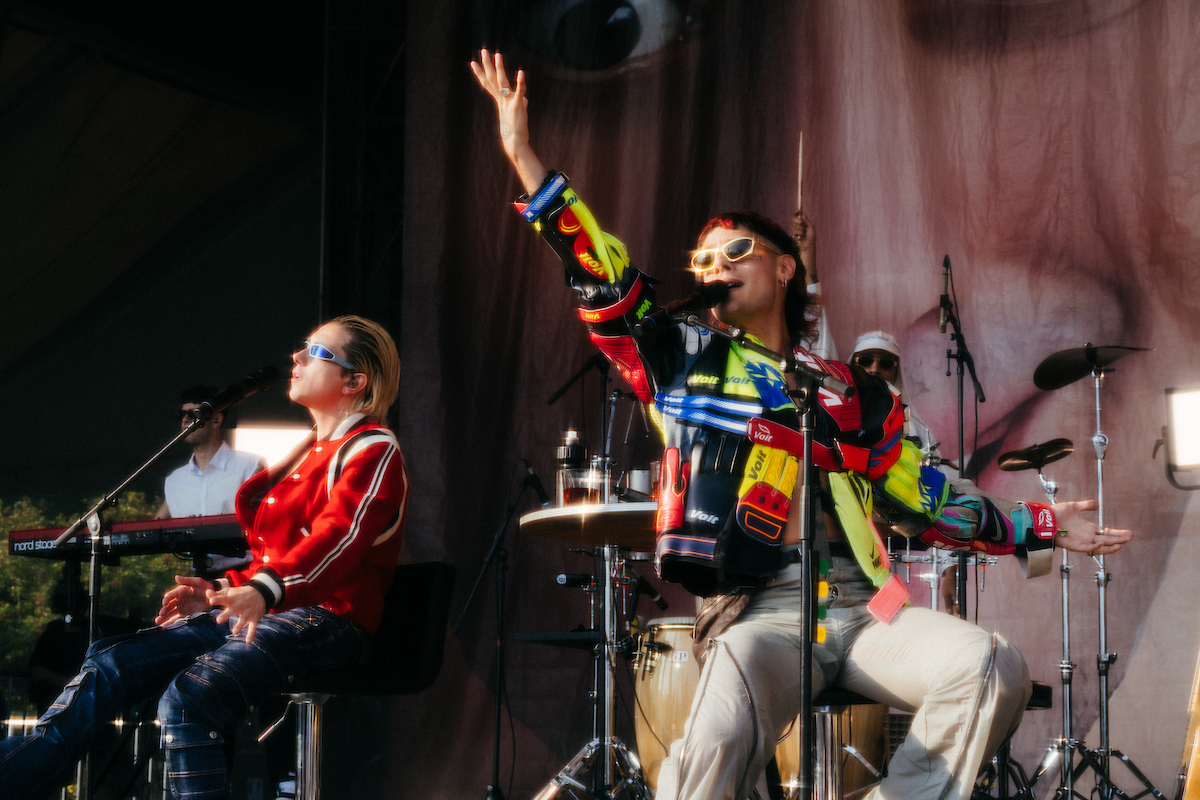
Ca7riel & Paco Amoroso by Ismael Quintanilla III for Lollapalooza.
DJO makes us feel it
A replica of Chicago’s Bean fills the stage, glowing green around the edges as if eclipsed by a strange sun. DJO (the moniker of Joe Kearny of Stranger Things fame) belts out a strange prelude over a glimmering synth arpeggiation. “Love and hate decide / Money, murder, lies / The future is the same / Why try?”. It’s a dour line to frame a set with, but it gives us a hint at DJO’s M.O. – ethereal yet grounded, cynical but open to delight.
Without skipping a beat, the band rolls into the highly acerbic “Gloom,” a manic exploration of growing misanthropy that evolves from a personal slight into a worldview. “I hate this city, yes, I’m ready to go!” he shouts “I never liked it, I belong on the road.”
DJO’s sound is evolving and eclectic, meandering from highly produced synth rock to the more upbeat Ringo-esque piano bop “Charlie’s Garden,” complete with a facetime from Charlie Heaton. It’s a smart move to put a finger on your fame. Especially when making the transition from TV star to musician. DJO celebrates the connection, but then moves on.
And he more than acquits himself, embodying a laid-back, classic rock cool that is both charming and commanding. He manages to infuse the wild messiness audiences live for in a live set with polished numbers that alternate between the heartfelt (“Chateau”) and the tongue-in-cheek (“Basic Being Basic”).
The melancholic anthem “End of Beginning” rose to a new level, framed by the city’s towering skyscrapers. “And when I’m back in Chicago, I feel it,” he bellowed, with enthusiastic support from the “biggest crowd he’d ever seen.” The hit bled straight into “Back on You,” for which DJO brought out forty teenage singers from Uniting Voices, to bring the set to a truly transcendent close. It was a celebration of the city, with the city, by the city. “I love you, Chicago,” he said as he exited the stage, seeming as overwhelmed by the moment as we were.
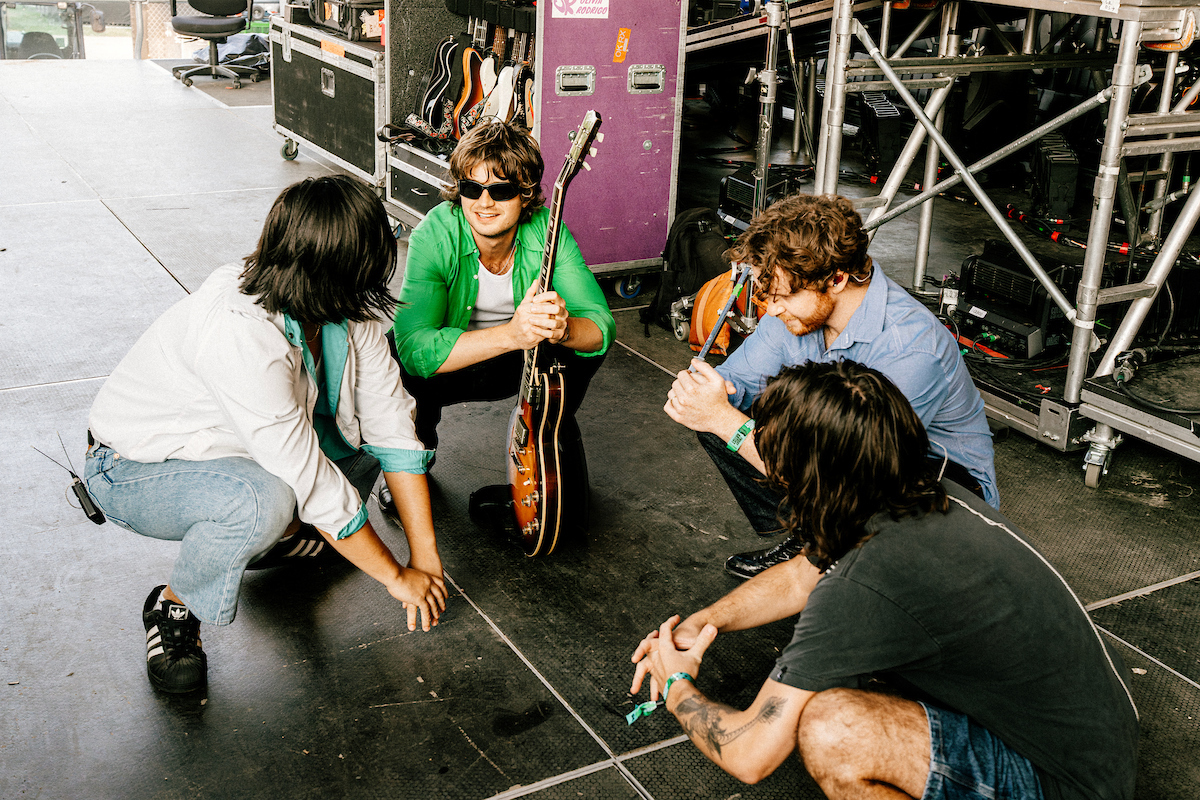
Djo by Pooneh Ghana for Lollapalooza.
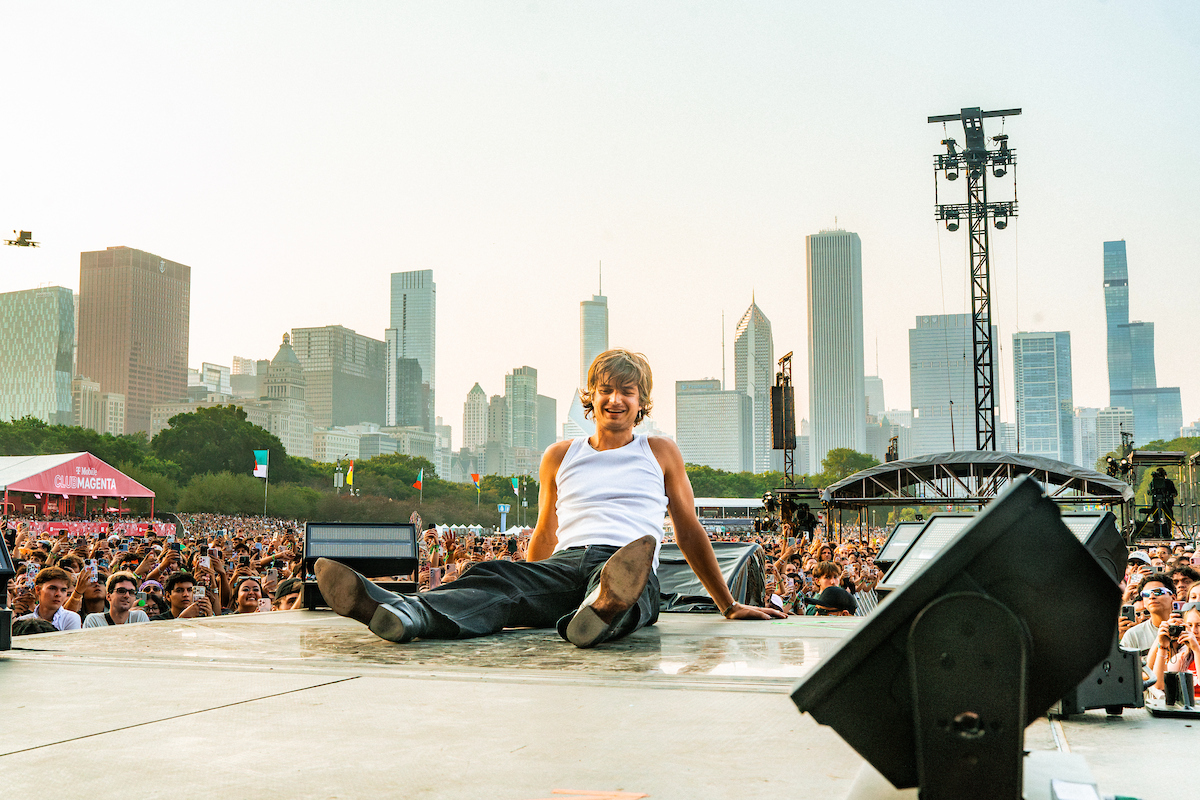
Doechii serves a masterclass
Welcome to Doechii’s School of hip-hop. Class is in Session. The real lesson is just as much one in hip-hop and rap, as it is in how to be a headliner. Placed in the seven o’clock slot on Saturday, the self-proclaimed Swamp Princess created a fully realised universe in the course of fifty minutes.
Dancers filled the rowed desks on the stage, hitting the tabletops to punctuate the percussion. Doechii, wearing a custom Dsquared2 fit and long braids styled to the right, struts on top of a giant boombox turned on its side. The set is spun by DJ Miss Milan, a longtime collaborator and an immaculate hype woman, who lets Doechii fully inhabit her character without the need to work the crowd. That character (or characters – Doechii the Don, Doechii the Dean, Doechii Supreme) prowls the stage with a reptilian calm, crawling over desks, twerking on the railings, and practically eating the camera.
Framed by the evocative imagery she crafted for her album Alligator Bites Never Heal, Doechii delivers her rapacious rhyme schemes with vigour and ease (see: Catfish and Nissan Altima). She pays homage to hip hop legends Trina (“Pull Over”) and Doug E. Fresh (“La Di Da Di”) as well as Queen Bey’s “America Has a Problem,” interpolating them into her now already iconic music.
Not a moment is left to chance. It’s choreographed with precise artistic vision, and executed just as masterfully, making you fully forget yourself for the remainder of the set. The festival’s other headliners paled in comparison to the spectacle she offered. Still on the rise after a historic win for best Rap Album at the Grammys — she is the third woman to do so— Doecchi’s performance is a testament to her staying power. She’s only just getting started.
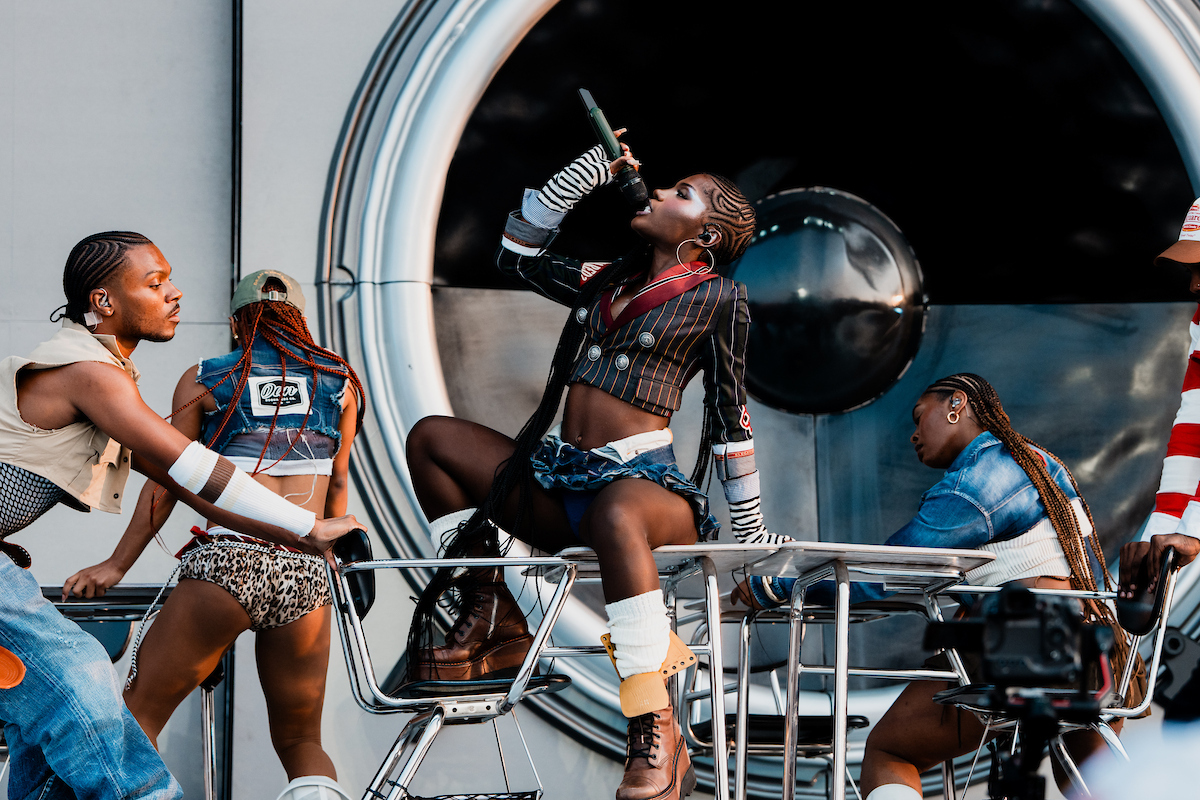
Doechii by Greg Noire for Lollapalooza.
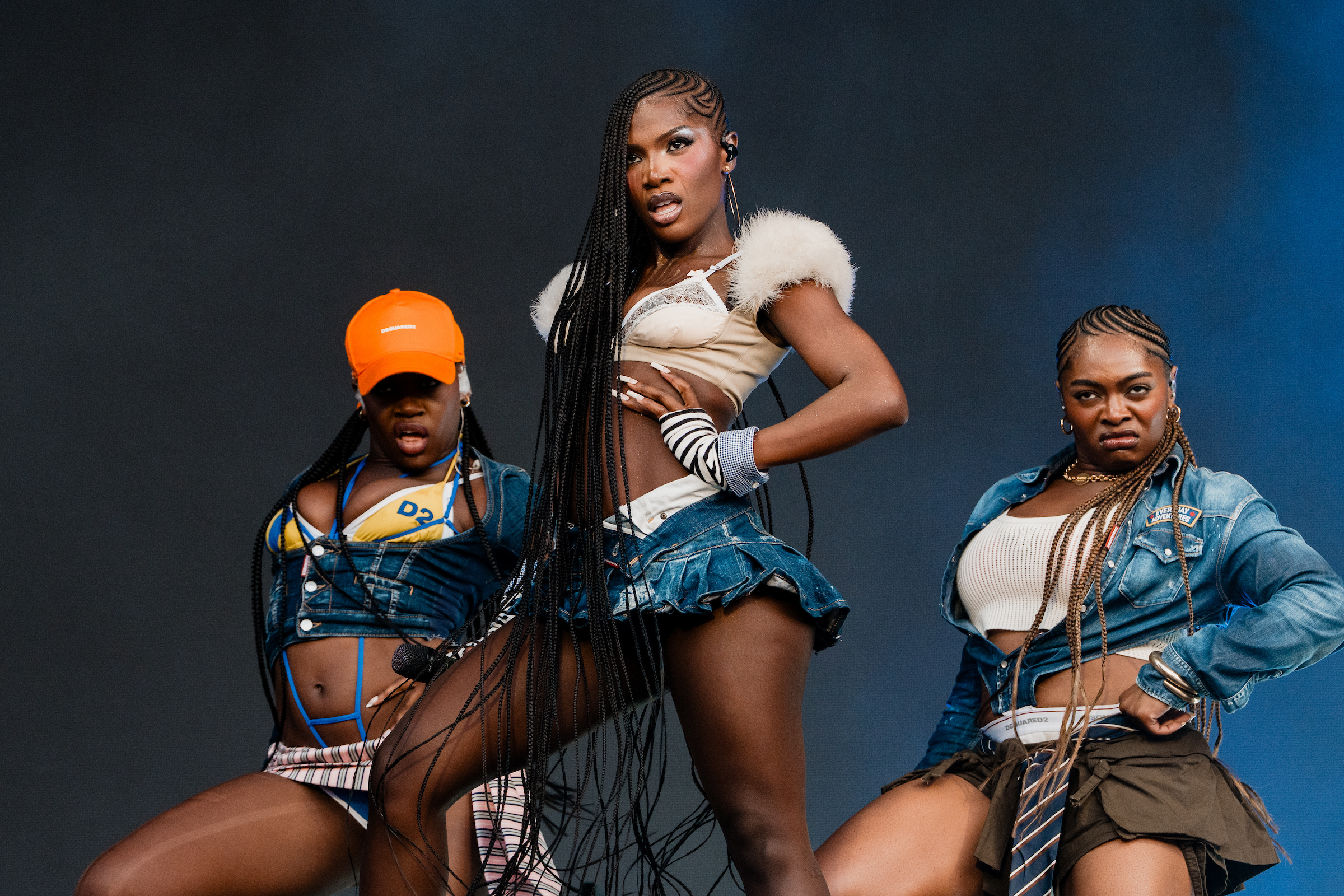
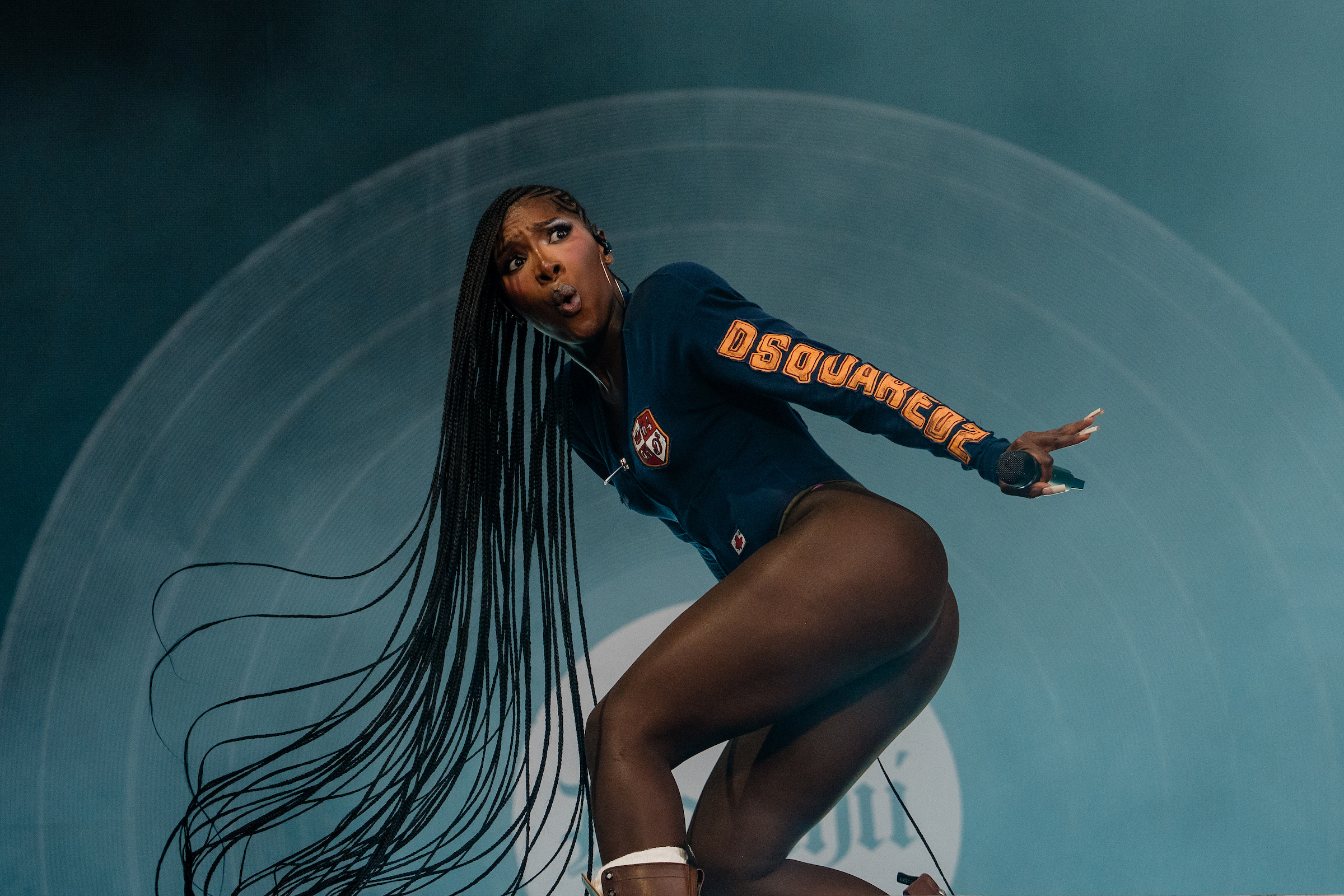
Hungry for the Wolf
Full disclosure: Remi Wolf is the artist I was most excited for going into Lollapalooza. I’m a fan of her music with its funky pop grooves, playfully horny lyricism, and vocals that would stir Janis Joplin in her grave. But I’ve never seen her live before, and had high hopes.
By Sunday afternoon, as I weaselled my way into the crowd, my excitement had been beaten down by four days of unrelenting sun. But at five o’clock, Wolf strode onto the stage, wearing a camo print cocktail dress and a see-through crinoline, charging right into her single “Cinderella” with the energy of a toreador. There’s a certain kind of breathlessness that takes over when you see an artist that sounds the same as their record yet somehow transcends it. Her voice is huge, filling up the air with an unpredictability that is as comforting as it is electrifying.
“You look like you could use a pick-me-up,” she teases the crowd before leading them through a series of exercises to “prepare them for the insanity.” It’s a full body shakeout, followed by a Freddie-inspired Ay-Oh call and response. “Now let’s take care of your brain,” she instructs us, “Put your finger on your forehead and shake that shit out!” And just like that, the crowd was out of their heads, into their hips, and ready to party.
Songs like “Liz,” a celebration of a woman who “taught [her] how to live,” strike an emotional chord, while “Toro,” a bawdy celebration of good sex, shows off her dynamism as a songwriter. As a lyricist, she’s as clever as Sabrina Carpenter or Chappell Roan, but less about showing it. In fact, the innuendo takes a back seat, it’s the music that fucks. You can see it in the musicians, gyrating their hips inside the groove. More importantly, you can see it in the audience who are doing the same.
Beyond the music, Remi Wolf is just cool. She feels like the missing third to Abbi and Ilana from Broad City; funny and flawed, self-embracing and self-frustrated. It’s fascinating watching her on the same weekend as superstars Rodrigo and Carpenter. Alongside Wolf, their on-stage personas feel glaringly crafted, reaching for relatability but too preternaturally famous to have it.
“Once again,” she said near the end of her set. “My name is Remi Wolf. I’m gonna keep saying it.” It’s a smart move for an artist who feels exceptional enough to headline. Still, there’s no need. Once you’ve seen her, she’s impossible to forget.
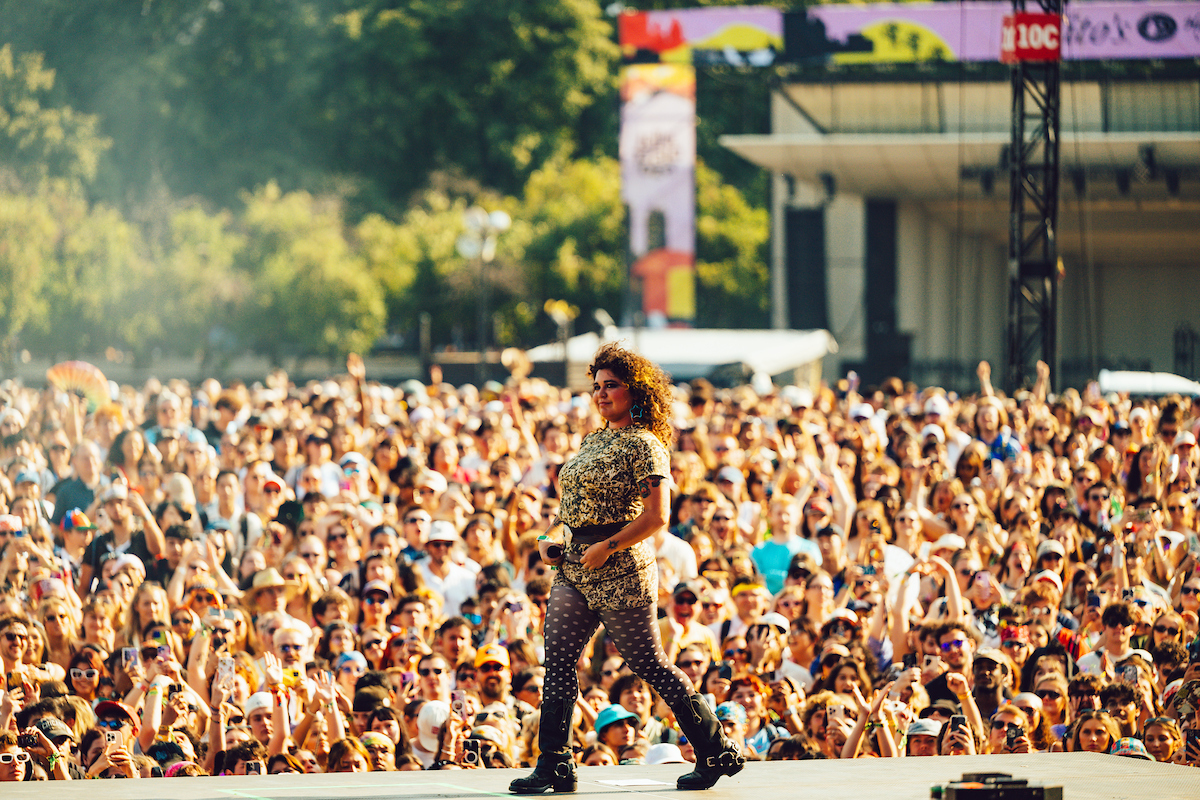
Remi Wolf by Charles Reagan for Lollapalooza.
